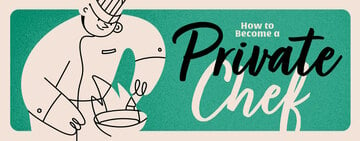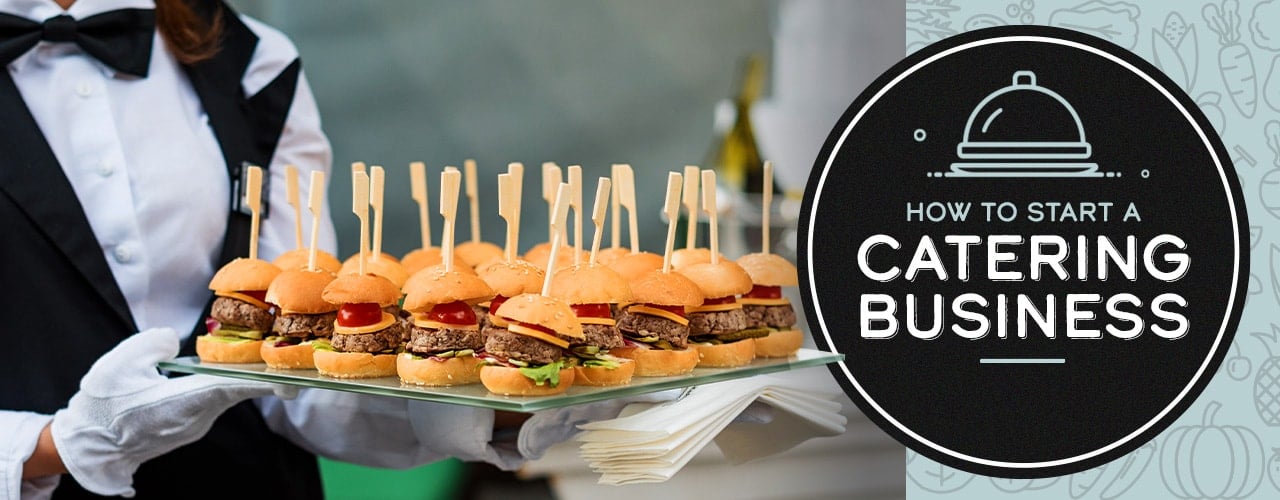
Starting a catering business can be an exciting and rewarding venture for individuals with a passion for food and hospitality. Whether you are a seasoned chef looking to branch out on your own or someone with a knack for event planning and organization, catering offers a unique opportunity for entrepreneurs to showcase their culinary skills without taking on the financial burden and risk of starting a restaurant. Despite these attractive features, there are still many factors prospective catering operators should consider before entering the industry and starting their business.
Shop Catering SuppliesWhat Is a Catering Business?
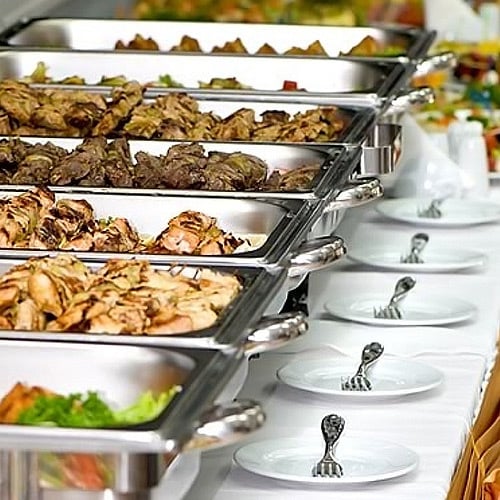
A catering company is a business that prepares food for special events, often creating a multi-course menu that suits the needs of the patron and event space. The food is either prepared on-site or transported to the location and served throughout the course of the event schedule.
How Much Does It Cost to Start a Catering Business?
To get your business off the ground, you can expect to spend somewhere between $10,000 to $50,000 on equipment, licenses, transportation, and marketing. The investment can certainly pay off if successful. Catering businesses can make around $30,000 to $80,000 annually.
Pros and Cons of a Catering Business
Before you begin buying equipment or drafting a business plan, it’s important to understand what makes a catering business unique.
Pros
Operating a catering business requires much less financial risk and burden than opening a restaurant while still offering you creative freedom. Many caterers can easily rent a space or equipment. Forego staff if your operation is on the small side and reduce food waste by cooking for a predetermined headcount.
Cons
Catering an event often puts you and your food in a less controlled environment than a restaurant. When you own a restaurant, you’re preparing food in the same kitchen every night and serving in the same dining room. With catering jobs, you’re either preparing food in a rented kitchen or on-site. During the event, you and your food are at the mercy of the venue space, their amenities, the weather, and staff you may not work with often.
What Do You Need to Start a Catering Business?
Starting a catering business can be a rewarding venture for those with a passion for food and hospitality. However, before diving into the world of catering, it's essential to understand the key components needed to get your business off the ground. Here are the essential elements you need to start a catering business:
1. Choose a Concept
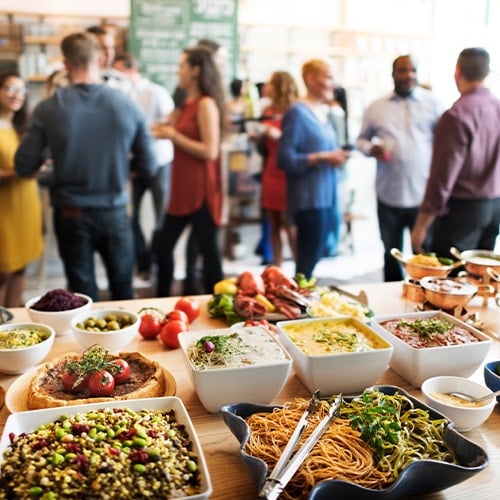
Creating a solid concept or theme can enhance the marketability of your catering business. Try to focus your concept on something you’re interested in or, better yet, passionate about. Do you have a specialty you’ll serve or will you be catering to a particular dietary need? Menu concepts can include options like brunch foods, casual sandwiches, desserts, finger foods, comfort food, or any idea that gives your business direction.
Identify Your Target Audience
It’s also important to consider what type of catering business you’re interested in pursuing and the capacity you’ll be capable to cater to. These are just some of the target audiences that may be interested in hiring a catering company:
- Wedding Catering - Wedding catering is a popular niche that involves providing food and beverage services for weddings and related events. This type of catering often requires a high level of attention to detail, creativity, and the ability to work closely with clients to create custom menus that align with their vision for the big day.
- Corporate Catering - Corporate catering involves providing food services for business events, meetings, conferences, and other corporate functions. Catering corporate events typically requires a focus on efficiency, professionalism, and the ability to cater to a large number of people with diverse dietary preferences.
- Event Catering - Event catering encompasses a wide range of social gatherings, such as birthday parties, anniversaries, holiday celebrations, and more. Due to the wide variety of events you can cater, event catering can be extremely versatile and may involve offering a variety of menu options to suit different occasions and themes.
- Food Truck Catering - Food truck catering involves operating a mobile catering business that serves food at various locations, events, and festivals. This type of catering offers flexibility and the opportunity to reach a broader audience by bringing your culinary creations directly to customers.
- Restaurant Catering - Restaurant catering involves extending your restaurant's menu and services to cater events, parties, and gatherings. Pivoting your restaurant into the catering industry can be a natural extension of your existing restaurant business and can help you generate additional revenue by tapping into the catering market.
Research the Area
When choosing your theme, it’s important to think about the demographic you’ll be serving, how you plan to price your services, and if you can access the equipment needed to sustain your theme. In your location analysis, you’ll want to take stock of the competition in your area to ensure that your niche will be well accepted in the community you have chosen. As part of your research, you can contact potential customers who are likely to hire caterers, like wedding planners, event coordinators, and conference centers, to see what they look for when working with catering companies.
Gain Exposure and Experience
Like any business venture, it takes a certain level of experience to successfully execute a start-up. Consider working for an already established catering company prior to opening your business. While researching what you’ll need and how to operate is helpful, it won’t compare to the hands-on experience and guidance gained through a working professional.
If working for a catering company isn’t doable, volunteer to plan small-scale events for people you may know. Host a holiday party for friends and family or prepare a church luncheon for a small crowd. Operating on a smaller scale first allows you to find and fix potential problems and gain honest feedback from a forgiving crowd.
2. Write a Catering Business Plan
A compelling business plan helps organize your dream into tangible segments that will allow your investors to understand and support your vision. We’ve added the most common points you’ll want to include in your catering company business plan.
- Executive Summary - This section will recap the details of your business plan, so it is often easier to write it last.
- Company Overview - In this section, you’ll present your company mission statement with the goal of expressing why you would like to start a catering business.
- Concept and Menu - Explain your concept, what sets you apart, and what niche you will be filling with your menu selections here.
- Management and Ownership Structure - Create a game plan for what your management structure will look like, whether that means you’re managing alone or you’ll have managers operating under your supervision.
- Staffing Needs - Outline how many employees you’ll need to start off with and how many you plan to hire in the future as your company grows.
- Competitor Analysis - Here, you’ll want to share your research on the competitors in your area and who your target customers will be.
- Advertising and Marketing - Provide your marketing ideas in this section including social media plans, website layouts, and events you will attend to locate clientele.
- Financial Summary - Finally, you’ll need to provide a breakdown of your financial expectations, including start-up costs, overhead expenses, and profit margins.
3. Acquire Catering Business Licenses and Permits
Before you cater your first event, you must apply for the proper permits and ensure your kitchen and staff are well aware of food safety practices and regulations. Be sure to check the rules and regulations with your local jurisdiction to acquire all of the appropriate permits and licenses you’ll need for your catering business.
List of Common Catering Permits

- General Business License - Every business in the United States is required to acquire a business license to operate.
- Employer Identification Number - To receive a tax ID number and hire employees, an EIN is needed. This is issued by the IRS.
- Food Handler Permit - A food handler permit shows that you and your employees are familiar with and practice safe food handling practices in your business.
- Caterer Permit - In some states, a catering permit is needed along with a food handling permit, allowing you to distribute food safely as a certified catering company.
- Home Occupation Permit - If you are starting or operating your catering business out of your home, you’ll need a home occupation permit to legally certify your home as the headquarters of this business.
- Health Permit - To receive a health permit, a health inspector will need to visit the location where you prepare your food to deem your location and practices safe for handling food.
- Catering Business Insurance - You’ll want to protect your business from potential “what if’s” with general insurance options. These usually cover accidents, auto incidents, workers’ compensation, and property damage.
- Liquor Licenses - If you’re offering bar services, you must come up with a safe serving plan to ensure your staff is serving responsibly.
Plan for Potential Problems
A little planning can go a long way when it comes to unexpected foodservice emergencies. Think about common obstacles you could encounter with your catering business, and work with staff to establish a response plan.
Potential problems could include:
- Inclement weather at an outdoor event
- More guests to feed than you had expected
- Shortage of staff
- No access to power
4. Create a Menu
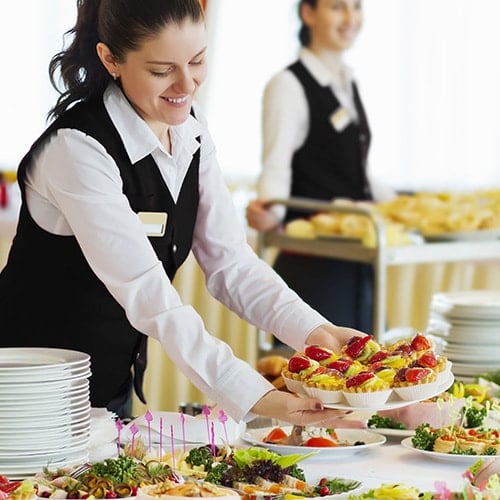
Create your menu for your catering business before you begin to look at workspaces and equipment. Figuring out what types of food you’ll be cooking means you can decide what equipment, appliances, and space you’ll need to successfully prepare your offerings.
While it’s important to stay true to your theme and concept, you need to offer a menu with the versatility to accompany a wide range of tastes, preferences, and dietary restrictions. Create a selection of offerings that are, for example, gluten-free, vegan, dairy-free, or low-carb. And if your menu items are especially spicy, be sure to offer a few more manageable options as well.
Once your menu is established, determine how you’ll price your items or event packages. It’s important to have a sample menu prepared and pricing figured out before meeting with your first potential clients.
Test Your Menu
Try testing your menu concept and dishes in small, no-pressure scenarios, similar to how a restaurant would host a soft opening. Gather friends and family together, or offer to cook for a small gathering or fundraiser in your community.
Be sure to ask for candid feedback from your guests. You can even provide everyone with a pen and paper to write their thoughts down anonymously. Once you’ve successfully served your crowd and received feedback, it is important to keep tweaking your recipes. Practice making them over and over again while focusing on efficiency, taste, and presentation.
5. Find a Suitable Working Space
Many states have laws and regulations in place to prevent caterers from operating out of their home kitchens. If you choose to do so, you’ll most likely need to make immense modifications to your home and receive approval from local governing authorities. Instead, most caterers start by renting out kitchen space or finding a building to make their own.
If you’re just starting out or operating at a low volume, your most economical option would be to rent a commercial kitchen space. This is ideal for those working one or two days a week or for only a few hours at a time.
For high-volume operations or those looking to make this a full-time business, you’ll want a place you can have access to 24/7 with more storage and customizable equipment. If you want to offer tastings for potential clients or sell your goods to the public, you’ll need to rent space with a separate storefront area from where you do your cooking or baking.
6. Buy Catering Supplies and Equipment
Next, you’ll want to customize and stock your space with supplies and equipment that are conducive to your cooking. Focus on what equipment will be most beneficial for preparing your menu items. For example, if you’re focusing on desserts, you’ll want to equip your kitchen with extra ovens. And if your specialty is Southern comfort food, more fryers are a must.
A complete catering supplies checklist will help you stock up on the appropriate inventory to help your business be successful. Here are just some of the supplies you may need:
- Table Settings - Dinnerware, flatware, charger plates, napkins, tablecloths, and glassware
- Display and Decor - Table numbers, dessert stands, cases, candles, and centerpieces
- Disposable Catering Supplies - Paper napkins, plastic cutlery, appetizer plates, cocktail picks, and foil pans
- Transport Supplies - Insulated pan carriers, glass racks, plastic bus carts, coolers, vending kiosks, and food storage boxes
- Cooking and Holding Equipment - Induction cookers, portable grills, holding cabinets, and outdoor burners
- Serving Equipment - Serving trays, chafers and fuel, serving utensils, and food pans
- Beverage Supplies - Beverage dispensers, coffee urns, coffee airpots, and ice
- Furniture and Seating - Folding tables, folding chairs, cocktail tables, bars, canopies, and tents
- Janitorial and Cleaning Supplies - Garbage cans, cleaning towels, disposable gloves, and handwashing stations
7. Catering Staffing Considerations
Finding the right staff members to help prepare and serve your offerings can be a challenging task. When choosing staff and introducing them to your business, be sure to consider the following:
Determine Staffing Needs
When starting a catering business, you must first decide whether your operation is large enough to hire additional employees. Depending on the size and scope of your catering operation, additonal employees may be required to help you execute events successfully. If you're unsure of how many staff members you'll need, consider starting with a temp agency that can provide you with flexible staffing solutions based on the demands of each event.
Create a Dress Code
Creating a dress code or providing uniforms for your staff is essential to maintain a professional and cohesive look at events. This not only enhances your brand image but also ensures that your staff members are easily identifiable to guests. Whether you opt for a formal dress code or branded uniforms, consistency in appearance is key to creating a positive impression on clients and guests.
Offer Training to Staff
Offering adequate training in serving protocols and food safety is crucial to the success of your catering business. Proper training ensures that your staff members are knowledgeable about handling food safely, following proper serving etiquette, and providing exceptional customer service. By investing in training programs for your staff, you can instill confidence in your team and deliver a high-quality dining experience to your clients.
Instill Good Communication and Etiquette
Foster clear communication channels among your staff members to ensure smooth coordination during events. Provide detailed event briefings, establish a chain of command, and encourage open dialogue to address any issues promptly. The importance of professionalism and etiquette should be emphasized among your staff members when interacting with clients and guests. You should also train your team to handle challenging situations with grace and ensure that they represent your business in the best light.
Create a Well-Rounded Schedule
As a catering operator, you need to create a work schedule that can handle the the rise and fall of demand for catering services throughout the year. Peak seasons in the catering business typically coincide with major events such as weddings, corporate parties, holiday celebrations, and other special occasions. Seasonal employment is a valuable resource for catering businesses during peak seasons because hiring seasonal staff allows you to quickly scale up your workforce to meet the demands of busy periods without the need for long-term commitments. Seasonal employees can help alleviate the strain on your full-time staff and ensure that you have enough hands on deck to deliver exceptional service to your clients.
8. Make a Marketing and Advertising Plan
Once you’ve laid the groundwork for your business, it’s time to market your catering business. Start by figuring out who your target audience is and go from there. This can be determined based on the type of catering operation you plan on running. For example, if you’re interested in social gatherings, you can showcase your menu at bridal expos and contact event planners.
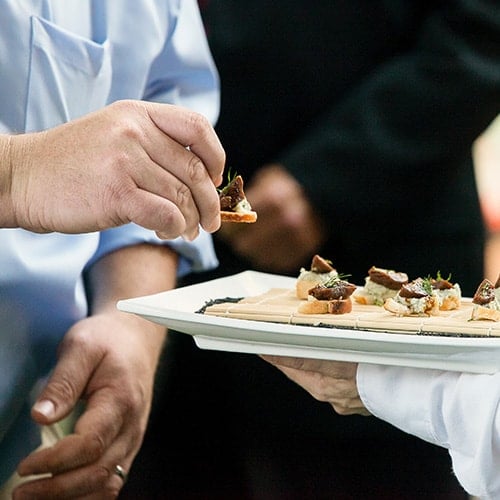
- Create a Memorable Logo - A visually appealing and memorable logo can help your catering business stand out and leave a lasting impression on potential clients. Your logo should reflect your brand identity and convey the type of services you offer.
- Utilize Printable Menus and Business Cards - Printable menus and business cards are valuable marketing tools that can be distributed at events, meetings, and other networking opportunities. Make sure your printed materials are professionally designed and contain all the necessary information about your services.
- Create a Website and Social Media Presence - In today's digital age, having a strong online presence is crucial for reaching a wider audience. Create a professional website that showcases your menu, services, and contact information and utilize social media platforms such to engage with potential clients and promote your business.
- Network with Event Coordinators - Building relationships with event coordinators can help you secure catering opportunities for weddings, corporate events, and other special occasions. Attend industry events, join networking groups, and actively reach out to event planners to expand your client base.
- Offer Tastings - One of the most effective ways to market your catering business is by offering tastings to potential clients. Offering tastings at events like fairs and charity events allows you to showcase your culinary skills, build rapport with clients, and secure bookings for future events.
- Track and Analyze Results - Monitor the effectiveness of your marketing and advertising efforts by tracking key metrics such as website traffic, social media engagement, and email open rates. Continuously analyze and optimize your marketing metrics and results to ensure you are reaching your business goals.
Starting a catering business can be a rewarding endeavor that allows you to showcase your culinary talents while serving delicious food to a variety of clients. From creating a business plan and obtaining necessary permits to developing a menu and marketing your services, there are many important factors to consider when starting a catering business. With careful planning, attention to detail, and a commitment to providing exceptional service, catering entrepreneurs can build a thriving business that delights clients and guests alike.
Back to Top



